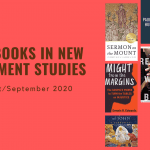Jonathan and I go back a long time. We were fellow seminary students. He was known to be a fastidious student, pursuing his courses with passion and excellence. And he brings those same qualities to his work as editor at Hendrickson. True story: I worked at Hendrickson in sales and marketing before I did my PhD. Hendrickson does good work, especially with reference resources. Jonathan is well-suited to produce high-quality reference materials in biblical studies. Enjoy this “excellent” interview!
 Tell us about yourself and your background.
Tell us about yourself and your background.
I grew up north of Boston, near Gordon-Conwell seminary, where my grandfather taught Old Testament for several decades and where my dad (who, slightly confusingly, has the same name) taught Semitic languages and worked in the library. I was fortunate to receive a broad liberal arts education in college and considered majoring in computer science, but in the end the gravitational pull of “the family business” prevailed and I decided to major in the obscure field of Near Eastern studies. After college, I studied biblical languages in seminary; I enjoyed Greek as much as Hebrew, but again, the allure of the latter eventually prevailed and I ended up going on to do a PhD in Hebrew Bible. People often ask me and my wife, who is an Old Testament professor, whether we’re teaching our kids Hebrew, or perhaps Akkadian or Ugaritic; we respond that our primary instructional focus right now is getting our older kids to clean up their toys before bedtime and encouraging our youngest one to learn to sleep through the night.
Few editors I know aspired to be in publishing. They sort of wandered into it and ended up enjoying it. How did you become an editor? What do you enjoy about it?
Yes, as seems to be typical, I didn’t plan on becoming an editor; in retrospect, though, and from the outside, it seems somewhat obvious that I ended up in this line of work. Since I was a kid, I’ve been highly detail oriented and have relished the fine points of grammar (full disclosure: I read Strunk and White’s Elements of Style poolside one summer as a teenager); and I had literary-minded friends growing up who helped me see that using language with precision and creativity can add zest to life. In terms of more direct experience, I did some editing for my grandfather while he was writing his last couple of books, as well as for a professor or two in college and seminary; and when I was in my doctoral program, I worked at the Harvard Theological Review. After grad school, I thought I might be a stay-at-home dad, perhaps doing a bit of freelance work on the side. But then the job of academic editor opened up at Hendrickson, and I was fortunate enough to be hired. It’s turned out to be a perfect fit: I love the work and my colleagues, I’m excited about the books we publish, and I’m able to have a broader influence through my work as an editor, I think, than I might have had as a professor, which was what I originally aspired to be. I’ve done my fair share of teaching over the years, and I still enjoy being in front of a classroom when I have the chance, but on the whole, working at Hendrickson has turned out to be a dream job for me.
What are some things that stand out to you in a book conversation with an author or a book proposal that grab your interest?
Competence in the subject matter one is writing on and the ability to communicate clearly are paramount, of course.
Second (and just as important, to my mind) is an author’s tone and attitude, both in writing and in person. The proposals that stand out the most to me are those in which an author writes winsomely and with humility; and the authors I tend to enjoy working with the most are those who display an openness to working collaboratively and the ability to receive constructive criticism. Like most relationships, the one between an author and a publisher (and specifically, the one between an author and an editor) works best when both sides act toward each other with charity, clarity, humility, patience, and flexibility; when everyone works together as a team striving to achieve a shared, mutually beneficial goal; and when everyone’s competence and expertise are accompanied by the ability to not take oneself too seriously.
Finally, I’m drawn to proposals for books that present information in fresh, interesting, and creative ways. Because there’s not always a lot of new data in the field of biblical studies, I’m particularly interested in how as authors and publishers we can help students, professors, clergy, and interested laypeople access the richness of data that may have been available for centuries but that remains out of reach to a lot of readers. There are a lot of introductory Greek and Hebrew textbooks on the market, for example, but there aren’t as many tools that help students, clergy, and other readers bridge the gap from introductory language study to fluent reading of the biblical text—which is where the real payoff and enjoyment come. I’m especially interested in finding and developing the kinds of resources that accomplish this, and I like authors who “think outside the box” and are willing to be creative in developing such tools.
What are your book proposal pet peeves? And what are common, but correctable mistakes that authors make when trying to pitch their book idea?
After evaluating whether the subject matter a potential author is writing on is a good fit for Hendrickson, the two main things I look for in a book proposal are indications of how much editorial investment the book will require and how much sales potential it has. For this reason, my main pet peeve—and this will sound obvious, but it’s surprising how often this occurs—is finding mistakes of grammar, spelling, and punctuation in a proposal and/or in one’s writing samples. Naturally, we all need help improving our writing (and we all make mistakes while typing), and I’ll be the first to admit that I need others to read and critique my own prose, which is why I always ask one or two colleagues or friends to help me revise what I write. A random typo or two in a writing sample isn’t anything to worry about, but since a proposal basically amounts to a sales pitch in which you’re trying to convince a publisher that you have something interesting to say and that you can say it well, it’s clearly to your benefit to have as few mistakes of grammar or spelling (preferably none) in what you submit. Again, it seems self-evident, but my recommendation to anyone creating a book proposal (and also, of course, to anyone finalizing a manuscript that has been accepted for publication) is to enlist the help of one or two sharp, trusted colleagues or friends to read through it thoroughly, offer incisive criticism, and help eliminate any errors that may be present.
A second thing I sometimes come across in a proposal that can diminish the chance of it being accepted is when an author “oversells” the audience for his or her book. For example, occasionally an author will claim that his book will appeal to professors and students in a variety of disciplines, to clergy, to both graduate students and undergraduates, and also to educated laypeople. Only rarely, however, does a single book appeal to this many audiences. By dint of experience, publishers tend to have a very good idea of which audiences will be attracted to which books, so when an author “overreaches” on this point, his or her proposal may be viewed with skepticism.
Talk about one or two books that you acquired or edited that you are especially proud of and why.
One book I recently edited that I’m particularly proud of is Creation Rediscovered: Finding New Meaning in an Ancient Story, by Jeffery Leonard, an Old Testament professor at Samford University. Jeff is brilliant, well read, and an excellent writer, and he’s also down to earth, humble, and kind. He’s a wonderful author to work with, and his book Creation Rediscovered has the potential, I think, to be a game changer for a lot of folks who have wrestled with how to reconcile the science they’ve learned in school and the faith they were raised with. One thing I really like about this book, though, is that it’s not only (or in fact primarily) a book about science and faith; rather, it’s ultimately a book about theodicy that reads like an exegetical detective story, and by the end of the book Jeff has provided us with a robust biblical theology encompassing both the Old and New Testaments that has real traction for our lives today. This is exactly the kind of book I’m looking for the most, not only as an editor but also as a reader: a book that challenges my assumptions, expands my horizons, tackles a sometimes fraught subject with both academic competence and warm encouragement, and in the end trains my focus on how I should live in the midst of a chaotic, turbulent, and out-of-control world. The subtitle says it well: Jeff helps us find new meaning and purpose in an ancient and well-known story.
There are many good pieces of scholarship by biblical scholars, but we are not necessarily good at the art of writing. If you were to help an author improve their writing and communication skills, what would you recommend?
In addition to obvious style recommendations (authors should write concisely, use the active voice, master the nuances of comma usage, and the like), my main advice would be to write as if you’re teaching. Think of your readers as specific, real individuals who, like you, are intelligent and interested in the subject matter you’re discussing but are also busy people with a lot of demands on their time and attention and who have a fair number of preoccupations and life stresses at any given moment. When you put yourself in your readers’ shoes in this way, you realize that most people aren’t simply looking for information, they’re looking for an expert to guide them into a subject in a skillful, engaging way that nourishes them not only intellectually but also emotionally and spiritually. Thus, content matters, of course, but how you convey that content matters just as much. This is why, as I said above, I’m most interested in working with authors who think about their writing in pedagogically creative ways and who can present (old) data using fresh and creative methods.
Another thing I’d strongly recommend to anyone writing in the field of biblical studies and related disciplines is to become familiar (the more familiar, the better!) with the guidelines found in the SBL Handbook of Style. (Acquaintance with the other main editorial authority used these days, the Chicago Manual of Style, will always do you good as well.) In particular, if you know the ins and outs of how to present bibliographical information in footnotes, if you’re at least moderately acquainted with the array of abbreviations, transliterations, spelling conventions, and the like that are found in the SBL Handbook, and if you can master a few basic but often misunderstood grammatical principles (such as the difference between nonrestrictive and restrictive relative clauses), your writing will come off as professional and polished (and your editor will be tremendously grateful for the time and energy you save her or him!).
Explain how you define and interpret “success” in your industry.
As I’ve mentioned, I think some of the best writing, especially in the field of biblical studies and related disciplines, emerges when an author approaches her or his writing with a teacher’s mindset. Therefore, success in my industry, as I see it, comes through producing books that—like an expert professor coming alongside her students—help readers engross themselves in a subject and that guide them through it step-by-step in an enjoyable, encouraging, and enlightening way. I experimented with this kind of approach recently by creating a book for Hendrickson called A Proverb a Day in Biblical Hebrew, which tries to make intimidating material easy to access for readers of all skill levels, and I’m excited to be working right now with a number of authors whose teaching expertise is a formative factor in the creation of their books.
It follows from what I’ve just said that a lot of the books I work on are designed for readers not simply to read through one time for the purpose of ingesting information but to come back to repeatedly, each time gaining new insights that, ideally, will benefit the reader on a holistic level. Books of this kind will, I hope, be useful not only for a few years but for a few decades or even longer. In addition to longevity of use, I also look for books that will appeal to people of different faith commitments, including people with no faith commitments at all. A good example of such a resource is Gary Rendsburg’s book How the Bible Is Written, which I edited and Hendrickson published in 2019. This fascinating and well-written book is intended to be of interest to both Jews and Christians, as well as to readers of other faiths or of no faith who are simply interested in how the Bible works as a masterful and complex literary composition.
Can you give some thoughts and predictions about how publishing in biblical studies can and/or should change in the next 10 years?
In this particular historical moment, we can see the vital need for respectful and patient listening (especially to those with whom we disagree), for humility and openness to self-examination and correction, and for seeking ways—both personal and in terms of societal structures—of caring for the sick and fighting for equity and justice for the vulnerable, the disadvantaged, and the oppressed. The Bible and the Jewish and Christian traditions have much wisdom to offer in these areas, and I hope that in this present time of hardship and soul-searching for many, as well as over the next decade, biblical studies publishers will continue to focus on producing books that really make a difference in people’s lives—books that robustly and honestly address the concerns I just mentioned, that help us (re)ground ourselves in ancient teachings on these topics, and that energize each of us to bring healing and hope to our neighbors and ourselves, that lead us to “live gently in a violent world” (to borrow from the title of a book by Stanley Hauerwas and Jean Vanier). One aspect of addressing these topics in a meaningful way, of course, is for publishers to recruit and give visibility to authors with a diversity of identities, backgrounds, perspectives, and experiences. We’re seeing promising signs of change and growth in this regard at the present time, but we still have a long way to go in order to actualize this goal. One of the many reasons I appreciate Hendrickson’s ecumenical approach to theology and its focus on publishing primary source materials (especially Hebrew and Greek resources) is that such tools can provide a common ground to readers of all backgrounds and persuasions to conduct their research and to engage in dialogue with each other about the nuances of the biblical text and how it can shape our lives today.
If you were wanting to invite “fresh talent” to publish with your press, what is your pitch (right here and right now!)? How do you express your press’ identity and purpose and how do you want to shape biblical studies?
I hope that my many comments above have provided anyone patient enough to have read through them with a good sense of Hendrickson’s identity and purpose, of how my colleagues and I hope to shape the field of biblical studies, and of what kinds of authors we’re most excited and eager to collaborate with. In a nutshell, I’d describe our mission as that of producing rich, inspiring content that is both academically excellent and highly accessible and that will be of long-lasting value to the academy, the church, and other communities that value the Bible. One of the main goals of our publishing program, and my main focus as academic editor, is to provide readers with a direct, authentic encounter with the biblical text that encourages them to meditate on it deeply, to let it shape their character, and to put its teachings into practice in their lives.













